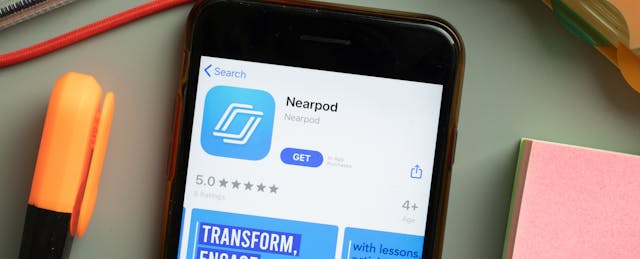With constant budget pressures, protracted sales cycles and a diffuse web of different purchasing processes, the K-12 education market is not for the faint of heart, especially for startups looking to establish themselves. It has long had a reputation for moving much more slowly than the pace at which startups need to operate to survive and grow.
But another blockbuster deal in this sector, in the middle of an ongoing pandemic, offers proof that it can be done—and deliver handsome returns.
Renaissance Learning, a provider of K-12 software and assessments, including the widely used STAR tests, has agreed to acquire Nearpod for $650 million.
It’s a big deal for a startup that was founded in 2011 on the bet that as internet connectivity and mobile devices became more affordable and accessible in classrooms, teachers and students would need a way to create and share digital content and resources. Early iterations of the Nearpod platform provided a way for teachers to upload and distribute digital lessons in the form of interactive slide decks, and track student progress and interactions with the materials.
Nearpod has since expanded the toolbox with features that let teachers create quizzes, offer virtual reality content for digital field trips, and embed mini-games into lessons. There is also a library of over 15,000 pre-made lessons from third-party providers including Amplify, Desmos, iCivics and Teaching Tolerance.
That founding bet has become a necessity and a given, as the COVID-19 outbreak drove schools to find ways to continue instruction remotely. In 2020, an estimated 19.5 million lessons were taught on Nearpod, marking a sixfold increase from the previous year, according to its CEO Pep Carrera. “The pandemic really accelerated the need for teachers to find ways to continue doing things that were once easily done in classrooms,” he says in an interview.
Today, the platform is used by 1.2 million teachers across the world, and in 75 percent of all U.S. public school districts. The company is also currently turning a profit, according to Carrera. Nearpod offers some of its content and tools for free and sells licenses to individual teachers, schools and districts.
Serious conversations between the two companies began last November, as Renaissance was scanning the market for tools that would help educators deliver online lessons in real-time and asynchronously, according to Todd Brekhus, chief product officer of Renaissance Learning. Nearpod quickly emerged as an opportunity that not only complemented its existing products, but also “aligned with our desire to be even more engaged with teachers,” says Brekhus.
Dating back to 1986, Renaissance Learning has established its name in the education market largely through its STAR assessments and Accelerated Reader and Accelerated Math programs. The company has changed hands several times. In 2014, it was acquired for $1.1 billion by Hellman & Friedman, which then sold Renaissance to a different private equity firm, Francisco Partners, in 2018 for an undisclosed price.
Under Francisco’s ownership, Renaissance has been pursuing acquisitions to bring other education technologies under its fold. These purchases include myON, a K-12 literacy platform, Early Learning Labs, a provider of curriculum and assessments for young children, Freckle Education, an instructional content provider, and Schoolzilla, a suite of data analytics tools for schools and districts.
“There’s very little product overlap, and a lot of synergy in terms of what we can do for students and teachers,” says Nearpod’s Carrera.
Both executives said that while there are no specific plans yet to integrate Nearpod more closely with any of Renaissance’s products, Nearpod will retain its brand. The deal is pending regulatory approval. If cleared, Renaissance Learning will add nearly 300 staff from Nearpod and have a combined headcount of roughly 1,500.
The all-cash deal will also deliver hearty returns for investors in Nearpod, which to date has raised just shy of $31 million in venture capital. Its largest institutional shareholders are Insight Partners, which led its $21-million Series B round in 2017, followed by Reach Capital.
The size of this acquisition dwarfs that of a similar one last year: Discovery Education’s $140-million purchase of Mystery Science, a provider of elementary-grade science curriculum. (Mystery Science had raised just $4.5 million in outside capital.) Earlier this month, IXL Learning, a K-12 instructional content provider, acquired the language-learning portfolio of Rosetta Stone and tutoring marketplace Wyzant. The financial terms of those deals were not disclosed.
To Brekhus, who has been working in education technology companies since the turn of the century, the industry appears to have reached a stage where proven solutions are emerging, creating ripe acquisition opportunities as the market begins to consolidate.
As in previous edtech market cycles, “there are winners and losers, those who succeed and those who struggle,” says Brekhus. “But now, gone are the days where you have to wait years to get a product out the door and see if it works. Cloud-based technologies today offer the ability to quickly improve and iterate, and test if your tools really resonate with the market.”
According to Moody’s credit rating report for the Nearpod acquisition, Renaissance “will have good liquidity with $71 million cash on balance sheet to fund seasonal working capital needs and is expected to generate positive free cash flow of over $30 million over the next year.”


